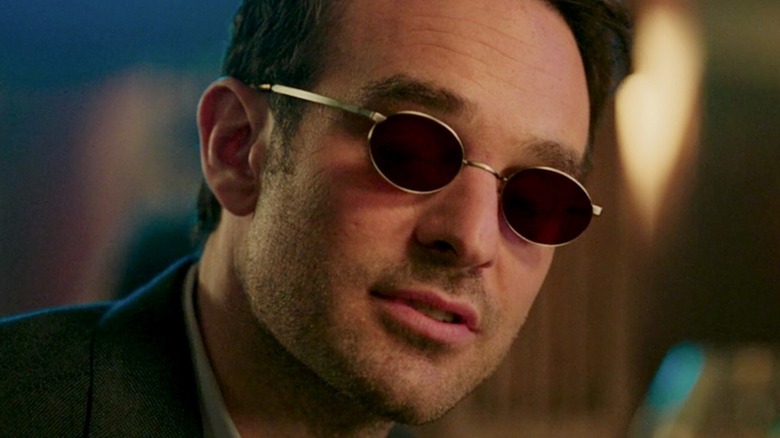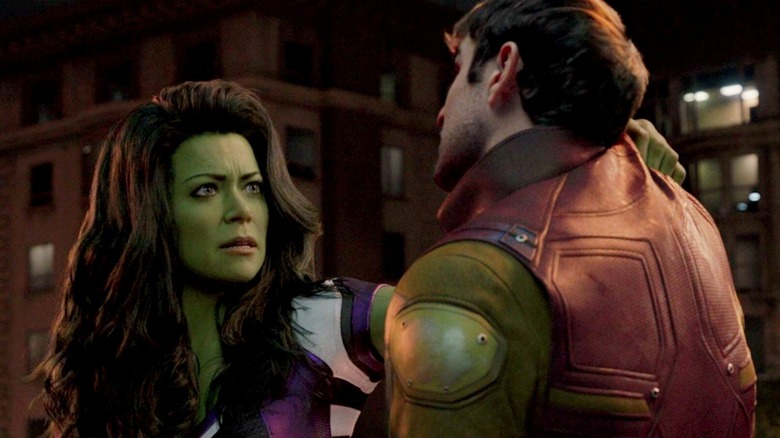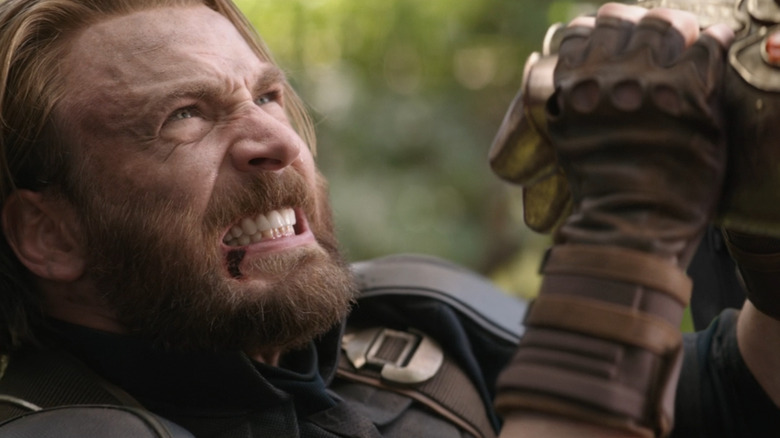Why Daredevil Seems So Much Faster During His Fight With She-Hulk In Episode 8
To define a superhero's abilities and prowess can be somewhat of a tenuous ordeal. Sure, most of them have a specific skill set like the ability to project energy blasts, enhanced strength and speed, technological knowledge, or even magical items that can transform an individual. As such, it can be somewhat tricky to figure out a hard line when a superhero is no longer able to fight on an even keel against a foe, especially since most superheroes will rush headlong into danger, regardless of the consequences in order to do what is right.
Officially making an appearance as both his lawyer and superhero persona, Matt Murdock (Charlie Cox) has entered the MCU in "She-Hulk: Attorney at Law." Previously, the actor played the role in the Netflix series that ran from 2015 to 2018, and Matt Murdock's first MCU appearance is in "Spider-Man: No Way Home," where he offers legal counsel to Peter Parker (Tom Holland). Unfortunately, fans only got a chance to see Murdock flexing his legal muscles in this particular film, but "She-Hulk" decided to do both by showing his elite legal skills and ability to moonlight as a superhero. However, some may wonder why Daredevil is able to hold his own against She-Hulk for a period of time, and the reason involves the ill-defined boundaries of superhero powers.
The reason why Daredevil seems faster in She-Hulk is because the show isn't as grounded
Though Matt Murdock is a secret superhero, this knowledge isn't immediately available to Jen Walters (Tatiana Maslany) in the latest episode of "She-Hulk," and the two find themselves on opposite ends of a case involving Leap-Frog (Brandon Stanley). After a decisive ruling in the favor of Murdock and his client Luke Jacobson (Griffin Matthews), Jen receives a late-night call from Leap-Frog, who says he is under attack and needs help. Arriving at the scene in She-Hulk form, Jen confronts Daredevil, whom she believes is a villain. The two then fight, which sees Daredevil utilize all of his famous acrobatics and speed, but for fans of the Netflix series, the character seems significantly faster and more dexterous, but why?
Probably the most obvious answer is the format change between "She-Hulk: Attorney at Law" and "Daredevil." The Netflix show really focused on ground-level heroics and by doing so, grounded the character to make him and his conflicts feel realistic. Just think of those first few episodes of the show, which see the character completely out of breath after fighting his way through a hallway of henchmen. Although this iteration of the character still uses his greatly enhanced senses to engage in heroics, it never really crosses into true superhero territory. However, "She-Hulk" is very much a superhero show by focusing on a transforming woman with Hulk-based powers, which definitely isn't grounded in some reality, unlike Netflix's "Daredevil." This means that the character of Daredevil was basically given a power boost in order to fit more appropriately in the Marvel Cinematic Universe.
The power of superheroes can shift rapidly
Even more grounded characters like Bucky Barnes (Sebastian Stan), War Machine (Don Cheadle), Hawkeye (Jeremy Renner), and Black Widow (Scarlett Johansson) are capable of fantastic and superhuman acts when the plot requires, so it would make sense that somebody with incredibly heightened senses would be able to move with blinding speed and skill in "She-Hulk."
Not only that, but heroes in the MCU can be weaker or stronger as needed. Probably the best example of this is Captain America (Chris Evans) in "Captain America: The Winter Soldier" and "Avengers: Infinity War." Throughout much of "Winter Soldier," Captain America fights many normal humans, who at times appear to have the upper hand — the elevator scene definitely comes to mind. However, at the very start of "Infinity War," Thanos (Josh Brolin) absolutely manhandles Hulk (Mark Ruffalo) to such an extent that the Hulk refuses to appear for the rest of the movie, leaving Bruce Banner in somewhat of a predicament. However, in the final act of the film, Captain America is seen holding back Thanos for a short amount of time, which is pretty amazing considering that Hulk stood very little chance against the Mad Titan.
This highlights just how much a hero's power level can fluctuate in order to drive scenes forward. In other words, Daredevil appears to be faster and stronger in "She-Hulk" because he very much is, and a more grounded character (like his Netflix iteration) wouldn't have stood very much of a chance against She-Hulk. Ultimately, it is nice to see a less realistic version of the character that leans more into the "super" part of superhero.


